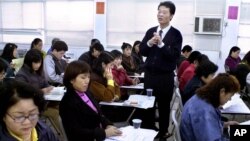A new report by a UN anti-trafficking agency has detailed the experience of Cambodian brides trafficked to China expecting a better life but instead end up married off to local men.
The report by U.N. Action for Cooperation Against Trafficking in Person (UN-ACT), published on August 25, was based on interviews with 42 women between September 2014 and March 2015.
It found that the women, whose ages ranged from 18 to 37, were usually recruited by brokers from their own communities under the false promise of a highly paid job in China.
Women who agreed to marriage arrangements were also misled, thinking they would be met with wealth, but instead were married to poor men in rural areas.
“The research has revealed that police officers, especially at the local level, at times seem ill-equipped for this task to date,” the report notes.
Cambodian women often have their passports taken away when they arrive in China and are forced to pay thousands of dollars in fees for the “service”.
When the women manage to escape their effective captivity, they may struggle to reach an embassy or consulate, which could be more than 1,000 kilometers from where they are sent.
During the escape, some women are caught by the Chinese authorities and returned to their husbands.
The reporting added that the lack of jobs and low wages in Cambodia had led the young women to seek work abroad, while the gender imbalance in China, leaving large numbers of single men without brides, had created demand for the women in China.
Chou Bun Eng, head of the National Authority Against Human Trafficking, said a formal agreement to combat the practice was likely to be signed with China later this year.
“We have to agree unanimously to lay out our prevention plans, help victims and investigate and punish those who commit human trafficking crimes,” she said.
The Chinese embassy declined to comment.
Thida Khus, director of Silaka, said most of the women trafficked to China come from poor families.
“In China there is no legislation to protect and no mechanisms to protect those migrants, therefore people who migrate for work or to get married face many problems,” she said.







